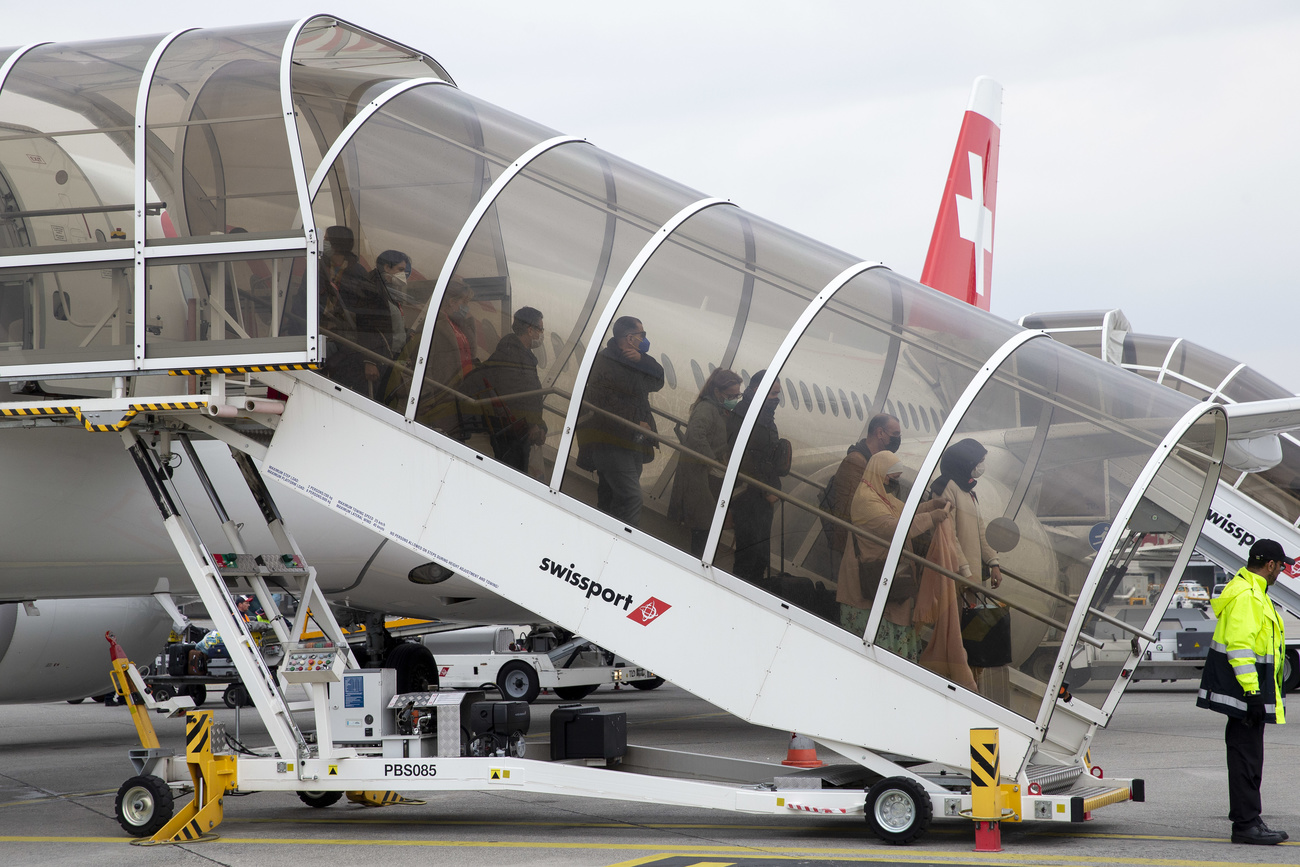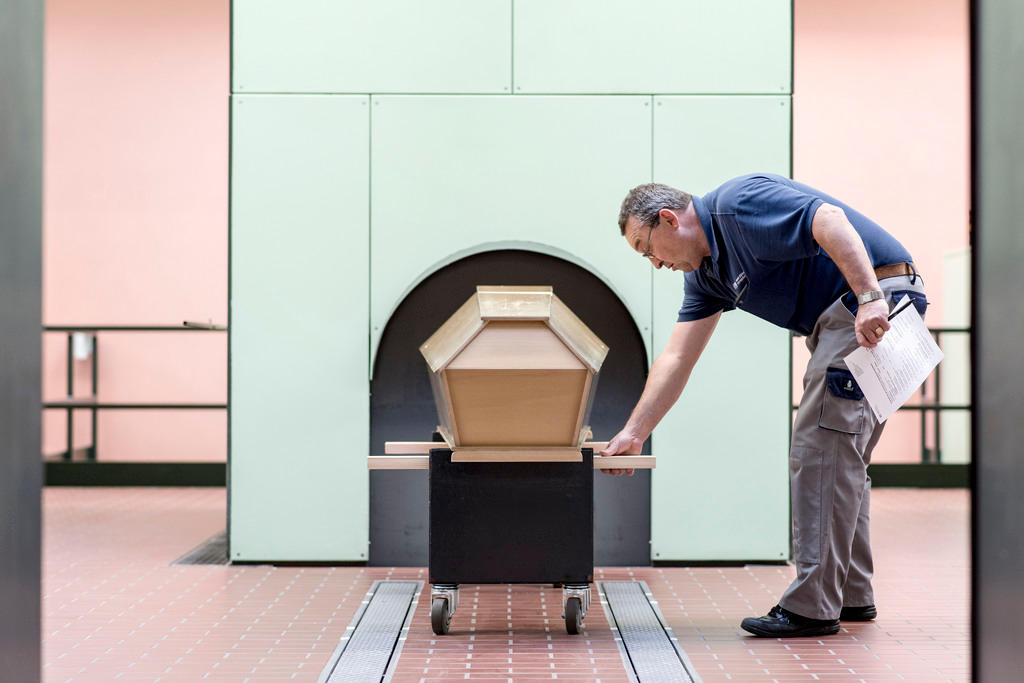Ageing expats cause headache for government
Swiss embassies and consulates are having to deal with more and more problems from the expatriate community that “exceed the remit of consular duties”, as they put it diplomatically. The Swiss government is now reacting with an awareness campaign.
Switzerland has 168 missions around the world, and the Swiss Abroad are increasingly expecting them to bail them out – to such an extent that the foreign ministry is now taking a strategic approach to deal with this trend. It would like its citizens who live abroad to realise that the government is not responsible for everything and everyone.
The campaign, which aims to remind expats of the principle of self-responsibility, was triggered by experiences connected to the Covid pandemic, but the problem has been around for some time. Examples of excessive demands and unreasonable expectations can be seen in letters and emails from Swiss expats asking for support from their representations abroad. Some of the letters were addressed to the foreign minister personally while others were sent to the relevant consulates or politicians. These were subsequently forwarded to the government in Bern.
“The foreign ministry is doing its best to help, but there are limits.” This was the mantra during the pandemic of Johannes Matyassy, head of the foreign ministry’s consular directorate. He repeated it on many occasions and often cited the case of someone demanding the Swiss government send a helicopter to a remote island near Venezuela to repatriate them.
Managing expectations
It was an extraordinary time, and the pandemic sparked the biggest repatriation campaign in Swiss history. In March and April 2020 the Swiss government chartered 35 airplanes to repatriate 7,255 people. All, apart from a few hundred, have paid back the costs of their repatriation.

More
Switzerland writes off small portion of flight repatriation bill
The foreign ministry wants to make its citizens realise that things are back to normal. It’s not about unpaid bills, the foreign ministry says, pointing out that it usually doesn’t charge for the many hours of work such cases require.
In retrospect it seems that Switzerland committed a regulatory sin repatriating its citizens during the pandemic. The government acted too generously and didn’t take into consideration the principle of subsidiarity, which states that a government should step in only when all other means and possibilities have been exhausted. At the beginning of the pandemic the government didn’t ask anyone whether there were other ways they could get back to Switzerland.
What’s more, being Swiss was not a criterion for repatriation. Swiss planes repatriated more than 3,000 citizens from other countries as well as foreigners living in Switzerland. “In return, other countries repatriated 2,155 Swiss citizens. The mutual support was an expression of international solidarity in action,” said foreign ministry spokesperson Andreas Heller.
The foreign ministry also points to the law. The Constitution says “every person is responsible for themselves”, while Article 5 of the Federal Act on Swiss Persons and Institutions Abroad states “every individual shall exercise personal responsibility when planning or undertaking a stay abroad or when working abroad”.
‘Ageing Abroad’
One part of the awareness campaign is called “Ageing Abroad”, which aims to help Swiss pensioners abroad plan their personal responsibilities as early as possible and take care of themselves for as long as possible. This affects 180,000 pensioners, some 22% of the global Swiss expat community.
Pensioners could spare their country and its representatives – as well as their relatives – some uncertainties and unnecessary work. Living wills, pension agreements and instructions in the event of death are some examples of what can be sorted out ahead of time. Ultimately, it is their responsibility to ensure that they are well looked after in the event of old age, illness or a lack of money.
When it comes to ageing expats, Thailand poses a special challenge. The number of Swiss pensioners there is twice as high as the average in other countries: 9,600 Swiss live in Thailand, two-thirds of whom are men and most didn’t emigrate until retirement. What’s special about this relatively recent demographic phenomenon is that they often end up in hospital.

As long as these pensioners – some of whom live in specialised old people’s homes – can enjoy themselves, everything is fine. “But then they get ill,” says a diplomat. “They can’t go home [to Switzerland] – their pension is too small – and they don’t want to go to hospital. So they expect the consulate to fix it.”
Costly health insurance
The situation has become more complex since Thailand introduced stricter rules for foreign pensioners during the Covid-19 pandemic. Since then, pensioners have been required to have health insurance that provides a basic cover of $100,000 (CHF96,000), including repatriation in the event of death.
Pensioners pay between CHF100 ($103) and CHF200 a month for private health insurance. This can be a problem, especially for those who emigrated precisely to live somewhere affordable. Thailand has now discontinued long-stay visas for pensioners without health insurance; the new visa is only for 90 days. The sticking point is that it is almost impossible to find private health insurance in old age or with pre-existing medical conditions.
A social security agreement between Switzerland and Thailand is currently being discussed. Bangkok-based Josef Schnyder, delegate for Thailand at the Council of the Swiss Abroad, wants pensioners abroad to be able to remain in the Swiss basic insurance system even if they live outside Switzerland.
Is it Switzerland’s problem?
Schnyder has recently contacted Johannes Matyassy at the foreign ministry to prod him into action. “Problem recognised!” Matyassy responded, referring to the consular consultations between Thailand and Switzerland that are due to take place in June. For more information on this matter, read our interview with Matyassy:

More
‘Swiss expats’ expectations are too high’
But is it Switzerland’s problem if Swiss expats can’t extend their residence permits in Thailand because they don’t have health insurance? Schnyder thinks there is certainly an interest on Switzerland’s part. “If ageing expats with a small pension and no savings return to Switzerland, they will be dependent on social welfare and become a burden for the Swiss taxpayer,” he says.

Apart from Thailand, the government’s campaign also focuses on the Costa Brava in Spain, Morocco, the Balkans and the Philippines. Last year 25 Swiss diplomatic missions in countries particularly affected by this problem were asked to fill in a questionnaire. The government now has a good overview of the situation in the affected countries.
Swiss expats have heavily criticised their consular services on Swiss expat forums. “Swiss embassies don’t take responsibility for anything. The diplomats are having a good time, and that’s it,” was one comment. “Unfortunately, you can’t expect much from our consulates,” was a post in one of the relevant Facebook groups.
More help than required
However, the foreign ministry is aware that in many cases Switzerland offers its citizens abroad more help than is legally required. Sometimes embassy or consular staff accompany people to hospital or invest hundreds of hours of work trying to solve individual cases.
More
This proactive approach and the planned “Ageing Abroad” campaign have put Switzerland at the forefront internationally when it comes to dealing with elderly expats. Pension funds will also be included in the campaign as this money is sometimes quickly exhausted.
And then there’s dying. This is often more complicated abroad than at home as several issues arise: Should the person be buried in the country where they died or should they be repatriated? And who pays for what? “The central question is who decides on this if there are no relatives or if any relatives don’t consider themselves responsible?” says Andreas Heller at the foreign ministry.
Death is thus a special case, since when a person expires, so does all personal responsibility.
Translated from German by Billi Bierling

More
‘I can’t afford to come back home for holidays’

In compliance with the JTI standards
More: SWI swissinfo.ch certified by the Journalism Trust Initiative














You can find an overview of ongoing debates with our journalists here . Please join us!
If you want to start a conversation about a topic raised in this article or want to report factual errors, email us at english@swissinfo.ch.